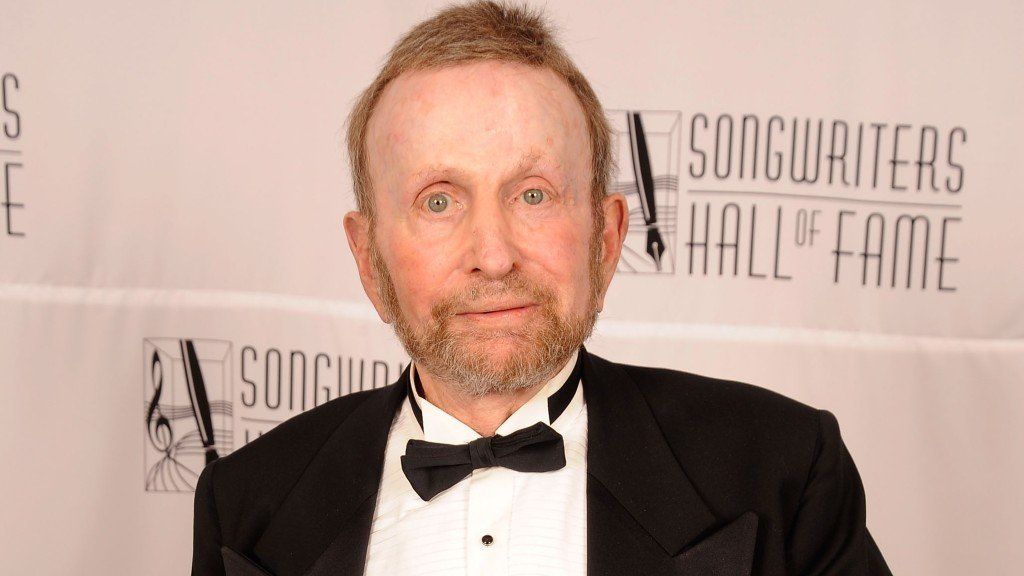Johnny Mandel: Michael Buble leads tributes to 'genius' Mash composer
- Published

Tributes have been paid to Johnny Mandel, the Oscar-winning composer of The Shadow Of Your Smile and the theme song to Mash, after the 94-year-old's death was reported in the US.
Renowned as one of the finest composers and arrangers of the 20th Century, he worked with everyone from Frank Sinatra and Barbra Streisand to Michael Buble.
Buble wrote that he was "so sad to learn that a hero of mine" had died.
The singer called Mandel a "genius and one of my favourite personalities".
Allow Twitter content?
This article contains content provided by Twitter. We ask for your permission before anything is loaded, as they may be using cookies and other technologies. You may want to read Twitter’s cookie policy, external and privacy policy, external before accepting. To view this content choose ‘accept and continue’.
Michael Feinstein, the pianist and singer known as the "ambassador of the Great American Songbook", also paid tribute.
"The world will never be quite the same without his humour, wit and wry view of life and the human condition," he wrote on Facebook.
"He was truly beyond compare, and nobody could write or arrange the way he did. Lord will we miss him."
Allow Facebook content?
This article contains content provided by Facebook. We ask for your permission before anything is loaded, as they may be using cookies and other technologies. You may want to read Meta’s Facebook cookie policy, external and privacy policy, external before accepting. To view this content choose ‘accept and continue’.
Born in New York in 1925, Mandel's mother was an opera singer who noticed her son had perfect pitch when he was just five years old.
After taking piano lessons, he fell in love with jazz at the age of 12 and switched to brass instruments. "I wanted to play an instrument you could kiss," he later explained.
He studied at the Manhattan School of Music and Juilliard School, both in New York City, and made his living in the 1940s as a trombonist and trumpeter, playing with the big bands of Joe Venuti, Jimmy Dorsey, Buddy Rich and Chubby Jackson, among others.
At the same, he was writing and arranging music for radio and the new medium of TV and, after a stint with Count Basie's band, decided to pursue a full-time career off the stage.
"The experience [of playing with Basie] was so wonderful that it seemed like nothing could ever come close to it," he said. "So after I left the band, I quit playing. I came out to California."
Moving to Los Angeles, he wrote elegant, orchestral arrangements for a wide range of vocalists including Frank Sinatra, Ray Charles, Peggy Lee and Anita O'Day.
"Johnny Mandel is the very best. When I hear one of his songs, I melt," said Tony Bennett, who won an Oscar with Mandel for The Shadow Of Your Smile, from the movie The Sandpiper, in 1965.
Allow YouTube content?
This article contains content provided by Google YouTube. We ask for your permission before anything is loaded, as they may be using cookies and other technologies. You may want to read Google’s cookie policy, external and privacy policy, external before accepting. To view this content choose ‘accept and continue’.
Mandel's movie career also included music for the Susan Heyward movie I Want To Live - considered to be the first time jazz had been integrated successfully into a musical score - and The Americanization of Emily.
In 1970, director Robert Altman commissioned Mandel to create "the stupidest song ever written" for his upcoming film Mash, set in a US Army hospital during the Korean war.
The melody, which was written to fit lyrics by Altman's 15-year-old son, was originally intended for the movie's pivotal Last Supper scene, but Altman found the music so affecting that he used it over the opening titles. Mandel objected and tried to insist that the song was removed.
"I said, 'You guys are crazy. It doesn't fit," he told journalist Marc Meyers in 2008. "You have these army medic helicopters flying in a war zone with this soft melody playing. It felt odd."
However, the film studio ignored his request and the track went on to become a worldwide chart hit, and the highest-earning composition of Mandel's career. He later remarked: "I'm glad I lost that battle."
Allow YouTube content?
This article contains content provided by Google YouTube. We ask for your permission before anything is loaded, as they may be using cookies and other technologies. You may want to read Google’s cookie policy, external and privacy policy, external before accepting. To view this content choose ‘accept and continue’.
His later film scores included Caddyshack, The Sailor Who Fell From Grace With the Sea and Agatha, which included the song Close Enough for Love.
Mandel also worked with Michael Jackson on the song Will You Be There, from the movie Free Willy, and arranged music for artists including Nancy Wilson, Diana Krall, Michael Bolton and Barry Manilow.
Over the course of his career, he won five Grammys and was inducted into the Songwriters Hall of Fame in 2010. He also served on the board of the American Society of Composers and Publishers for many years.
Tributes came from many of the musicians he had worked with, including Krall.
Allow Twitter content?
This article contains content provided by Twitter. We ask for your permission before anything is loaded, as they may be using cookies and other technologies. You may want to read Twitter’s cookie policy, external and privacy policy, external before accepting. To view this content choose ‘accept and continue’.
Follow us on Facebook, or on Twitter @BBCNewsEnts. If you have a story suggestion email entertainment.news@bbc.co.uk.